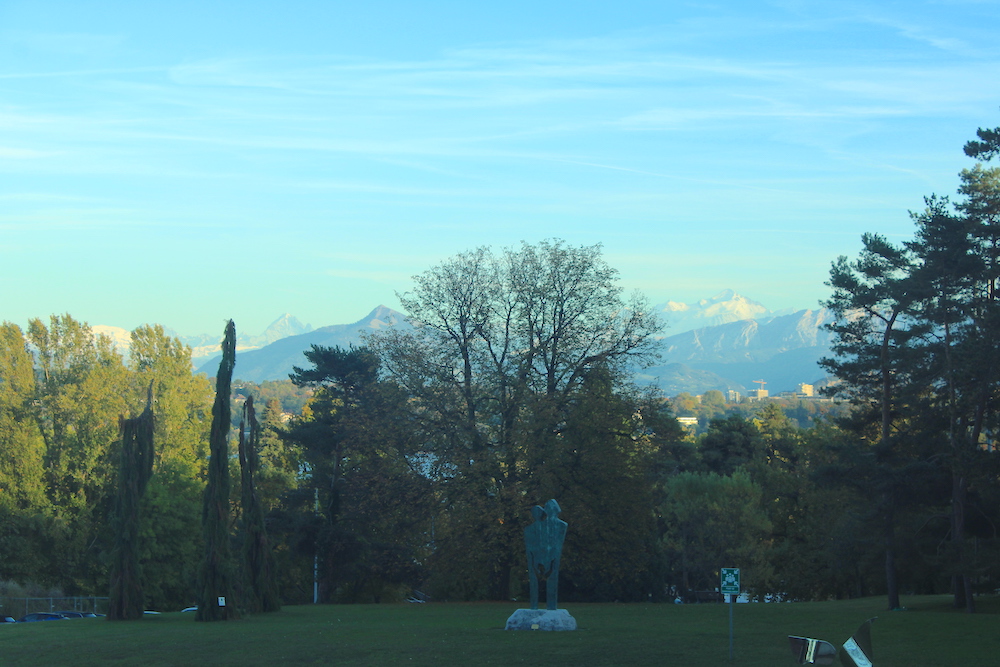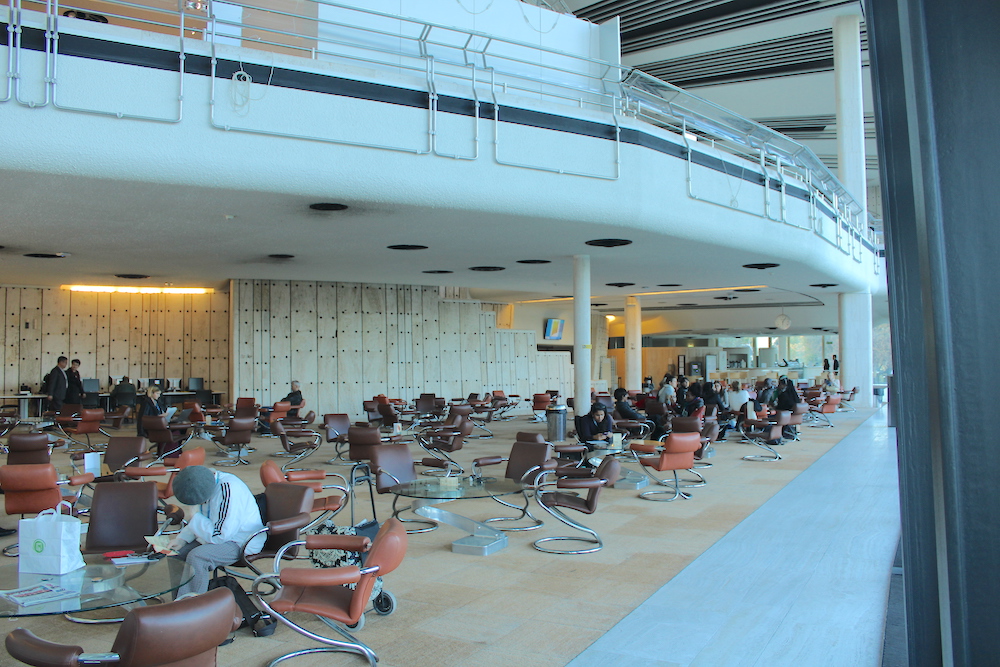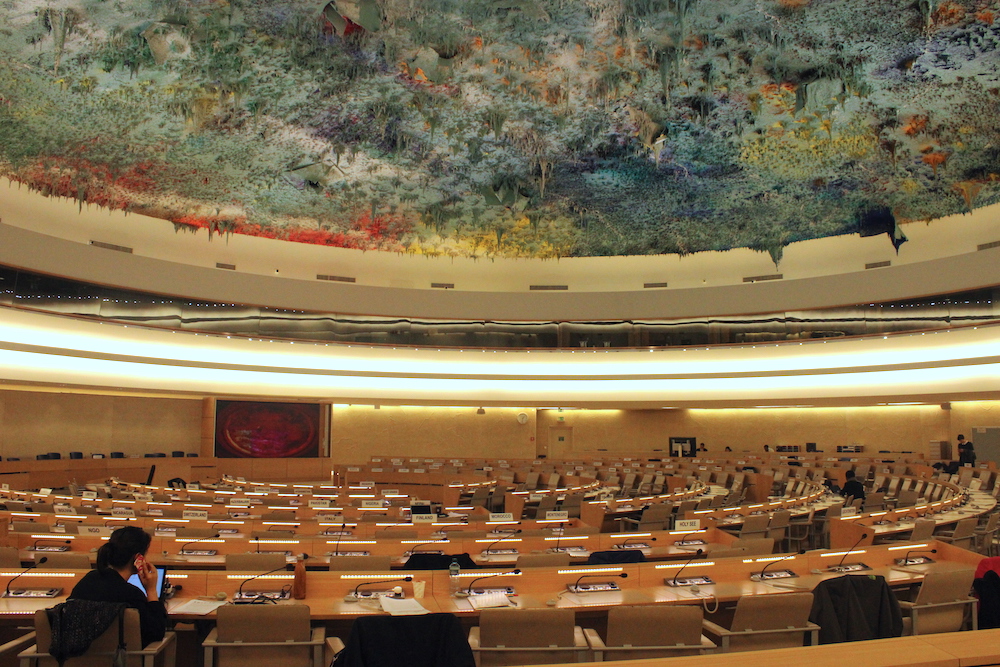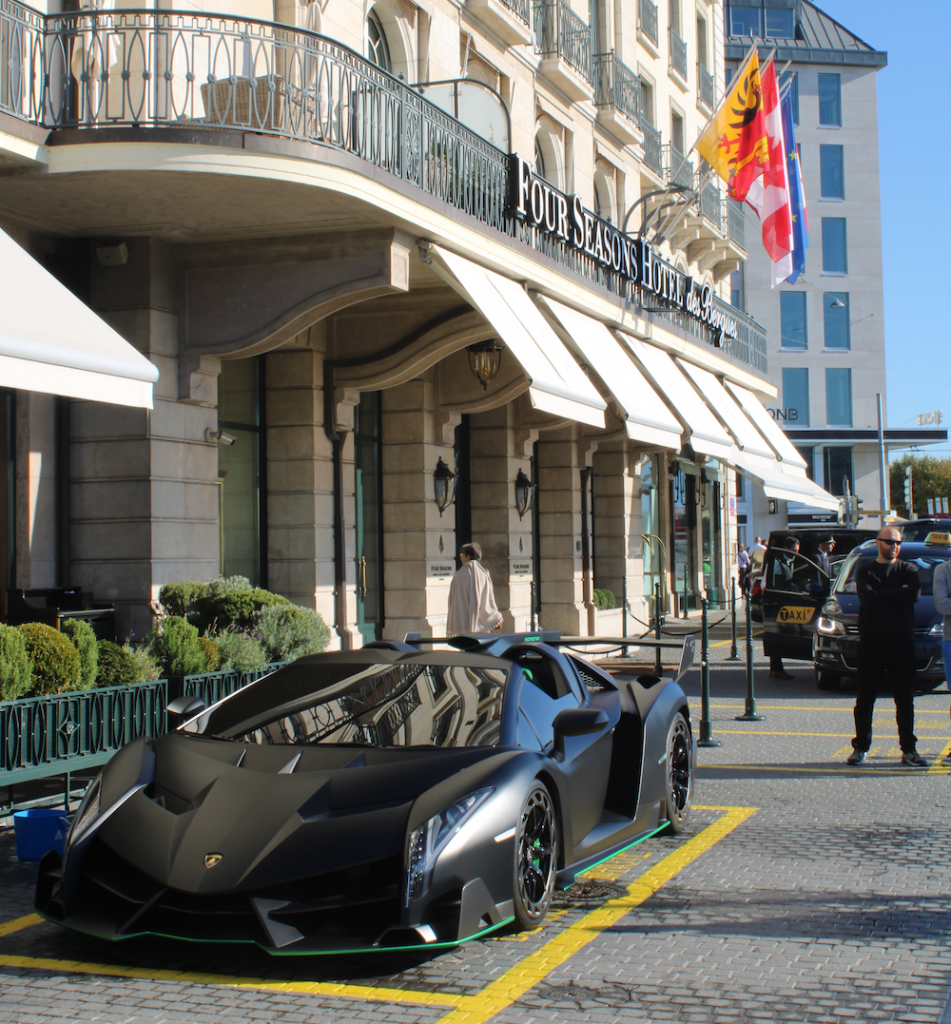The Struggle for a UN Binding Treaty
Hans Wetzels
David Bilchitz rushes through the Palace of Nations, dragging a small trolley filled with papers behind him. Since 2006 the United Nations Human Rights Council (UNHRC) has been based in this huge neo-classicist complex on Lake Geneva in Switzerland. In the distance, the snowy mountain top of Mont Blanc is glistening in a warm October sun.
Black cars with darkened windows and diplomatic license plates routinely drop off passengers at the main entrance. Bilchitz checks his watch: 20 minutes of interview-time. A South-African lawyer, Bilchitz usually teaches at the University of Johannesburg. Right now he’s on his way to the main UNHRC-meeting room, where diplomats and legal experts from all over the world have gathered to negotiate a revolutionary new UN-treaty that would establish a binding framework for international business.
Until now, a set of non-binding guidelines called the United Nations Guiding Principles (UNGP’s) are the only real obligation for businesses under international law. Meanwhile national governments are subject to hard laws, including investment courts. But all too often it’s precisely those multinational companies whose activities lead to human rights abuses or environmental pollution. Research commissioned by the EU Parliament even shows that it’s European companies in the garment, mining and agricultural sectors who are least likely to live up to their UNGP commitments. “The treaty we’re negotiating on here would finally end the legal inequality between unaccountable companies and states,” Bilchitz says. “That the European Union is unwilling to participate leads to a lot of impatience in the developing world.”
Global South
The Palace of Nations is located in the middle of a rustic park, just outside the Geneva city centre. Everywhere in the massive complex small gatherings of people are discussing, consulting and deliberating on their interests or the treaty text, building alliances or touching base with governments back home. Business cards change hands all day long, phone numbers are exchanged. A group of Chinese diplomats sits submerged in serious conversation around a glass coffee table in the main hall.

The Palace of Nations is located in the middle of this rustic park. Source: Hans WetzelsIt’s October 2019, and negotiations for the UN Treaty on Transnational Corporations and Other Business Enterprises just moved into their fifth round. On paragraph after paragraph, member-states give their opinions on legal ramifications, liabilities and the responsibilities of governments. Civil society is well-represented and participates in the ‘Global Campaign to Reclaim Peoples Sovereignty, Dismantle Corporate Power and Stop Impunity’ of more than 250 NGOs, social movements and affected communities, among them Friends of the Earth International (FOEI) and the Transnational Institute (TNI). The alliance managed to gather an impressive number of activists, lawyers and NGO employees from the Global South together in Geneva. Government representatives from South-America, Africa and Asia vastly outnumber the European and American diplomats present in the UNHRC complex. Uniting forces from the Global South in rigging up a binding framework for multinational businesses, in many cases originating from China or the US’s mega economy, notable by its absence in Geneva, is crucial for the treaty-process, TNI-activist Brid Brennan ascerts: “The west tried but didn’t manage to stop the treaty process. The role states from the Global South play in the UN is very important in times when the global multilateral framework is under assault as a whole. In this case their dynamic interaction is crucial for a robust outcome.”

Inside the Palace of Nations. Source: Hans Wetzels
Blockade
The main assembly hall in Geneva is big and bright. The multi-coloured ceiling is a sculpture by Spanish artist Miquel Barceló. The top row consists entirely of translators from English and Chinese, to Spanish, French or Russian and the other way around. The marathon-meeting is chaired by Ecuador – the country that initiated the treaty-process back in 2013. Back then, the South-Americans had been working to get compensation from oil multinational Chevron-Texaco for two decades after a series of oil spills in the Amazon. Year after year, Chevron-Texaco avoided prosecution by playing an international legal cat-and-mouse game. “Countries like Ecuador, or local communities affected by pollution, have no access to judicial remedy,” Bilchitz explains. “By their very corporate structure, multinationals can easily avoid ever having to appear before court. What we want is to be able to hold a company like Shell responsible in their native Netherlands for crimes committed by a Nigerian subsidiary.”

The main assembly hall in Geneva. Source: Hans Wetzels
In the global economy of the 21st century corporate strategies are usually developed in financial centres like Frankfurt, Shanghai or London. Resource extraction and much of the actual production is outsourced to developing countries where authorities and judicial systems are often weak or corrupt. In that complex web of global production it’s often unclear who bears which responsibility regarding human rights, ensuring living wages for workers, production norms, workplace safety or environmental pollution—Issues that could be cleared up once the UN Treaty on Transnational Corporations and Other Business Enterprises comes into effect.
A majority of 85 UN member states immediately backed the Ecuadorian proposal in 2013 – including China and Russia. But western nations resisted. American and Canadian diplomatic delegations didn’t bother to show up even once, while European diplomats did their utmost to prevent the negotiations from ever starting. “Nobody expected the US to participate,” Bilchitz remarks bitterly. “But that the EU tried to block this is a disappointment. Bragging to others about human rights and then refusing to take responsibility when it actually matters doesn’t fall well with a lot of countries.”
FOI
Officially the European Union is not a UN member-state and thus has no voting rights. But the EU-28 value a unified voice on the international stage. In order to streamline this, the European Commission launched its European External Action Service (EEAS) in 2010. The EEAS represents the EU during UN talks in Geneva, but is obliged to act on a mandate from the member-states.
Junior diplomats from Germany and the Netherlands silently stare at laptop screens or play with their phones under the colourful ceiling of the main UNHRC hall. They are not in any position to comment on the process.But when EEAS-diplomat Guus Houttuin takes the floor in Geneva, he dryly notifies the international community that the EU will once again not participate. Again, the Commission has refrained from even requesting the necessary negotiation mandate from the EU-28 in Brussels. “I have to admit this treaty was never a political priority for the Commission,” Houttuin explains in an interview afterwards. “The EU member-states are also divided on the issue. To ask for a negotiation mandate under these conditions would make no sense, from a political point of view.”
However, from internal EU-documents (obtained through an FOI-request) we learn that the European Commission proactively tried to block the EU-28 from participating in Geneva from the outset. During a meeting in Brussels in early 2014, EEAS diplomats more than once called on national delegates to ‘stop attempts led by Ecuador to work towards a legally binding instrument’. Houttuin: “Europe already does a lot when it comes to regulating the corporate sector. We’ve managed to establish regulations to keep out conflict minerals and combat illegal logging. Big companies have to account for their supply chains in several member states nowadays. Living up to all those standards is hard enough. If a couple of developing nations then suddenly propose a treaty of which the added value is not at all clear, while not doing a lot themselves to adhere to the rules that are already expected, don’t expect European states to jump up in enthusiasm.”
Lamborghini
Dickens Kamugisha travelled to Geneva from his native Uganda because he’s involved in several lawsuits against oil-company Total. He works for the Africa Institute for Energy Governance (AFIEGO) in Kampala. Total wants to explore for oil in a nature reserve at the Ugandan-Congolese border. Not only does the French oil company plan to drill four hundred oil wells, but also to build a 1,400 kilometre long pipeline and a twelve meter wide highway right through the reserve. Kamugisha: “Local farmers have to leave their land so Total can start building and exploring. They get very little compensation for the land itself and will lose the mango trees in which they have invested all their savings. Villagers were never consulted about the project, although that is obligatory under Ugandan law.”

The Lamborghini. Source: Hans Wetzels
The Ugandan stares across the crystal-clear water of the Genevan lake. A luxury yacht slides by in the distance. In front of the Four Seasons Hotel on the edge of the Quartier des Banques, a Lamborghini with Saudi licence-plates is parked in the sun. It costs 8 million dollars, according to the Russian guard next to the car. Kamugisha laughs about the irony of the current negotiations taking place in a capital-heavy town like Geneva. The Swiss reputation of absolute secrecy has been an irresistable magnet for African tax evaders, swindlers, dictators and traders in blood diamonds. “Total has a turnover bigger than Ugandan yearly GDP,” he says. “Such companies use the lack of good governance in Africa to drill for oil and then play innocent when African citizens get tear gassed. European resistance against this treaty is just a trick to ensure EU companies can keep making profits in Africa.”
Mining concession
Akhona Mehlo also travelled all the way to Geneva from Africa to give her professional opinion on the treaty-process. She works for the South-African Centre for Applied Legal Studies (CALS) at the University of Witwatersrand in Johannesburg and immediately underlines that the most developed economy on the African continent has its own struggles with both domestic and international business powerhouses. “In South Africa a company is obliged by law to give something back to the community once they have obtained a mining concession. They could choose to realize a building project to house their laborers or build a health clinic. In a lot of cases they just don’t live up to their promises, which leads to civil unrest in the often poor areas where most mines are located. Several incidents have been recorded where miners have been shot by police in order to suppress demonstrations against these corporations not fulfilling their obligations.”
Mehlo pauses, looks out the broad windows of the canteen of the UNHRC premises. “In a lot of countries in Africa the government and judiciary can be a lot weaker than in the west,” she continues. “Mining companies take advantage of that, and subsequently use their international nature in order to stay out of direct legal range of their victims.”
China
To make matters even more complex, it’s not even European and American companies anymore who are most active in Africa. The more China is manifesting itself as a new global superpower, the more Africa is confronted with an influx of Chinese companies exploring for oil, building roads, ports or buying up agricultural produce. Since AFIEGO decided to sue Total over building activities in the Ugandan nature reserve, the project has simply been taken over by the Chinese state-run company China Communications Construction Company (CCCC). “Eighty percent of all building projects in Africa are now Chinese,” Kamugisha explains. “French companies do bad things, sure. But at least they have public opinion to take into account. The Chinese don’t care about such things. I can’t possibly understand why the Chinese are and the Europeans aren’t participating in this treaty process.”
But despite the stubborn European resistance to the UN Treaty on Transnational Corporations and Other Business Enterprises, things are slowly shifting in Brussels. Already the Dutch government is lobbying in Brussels in favour of the negotiations in Geneva, and the EU Parliament adopted three resolutions in four years to urge the European Commission to finally rally behind the treaty process. EU diplomat Guus Houttuin has high hopes he will be able to get a mandate to start fully taking part in the negotiations in the future. He says reassuringly: “The key to get the EU behind this is Germany. German manufacturers are slowly realizing they have to compete with Chinese companies now. A binding treaty could actually level the global playing field in a way that benefits EUcompanies. I can’t imagine the EU will continue to have principal objections against this.”
For more, read Corporate Power A David and Goliath struggle for the 21st century or visit https://www.stopcorporateimpunity.org.